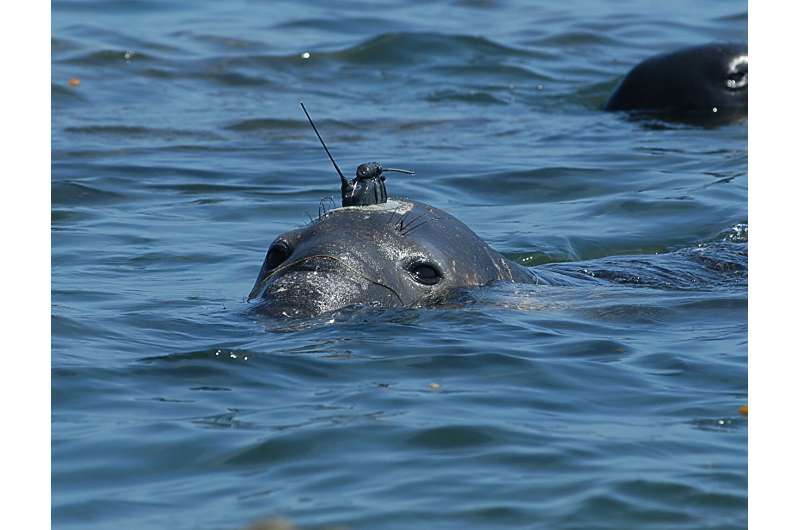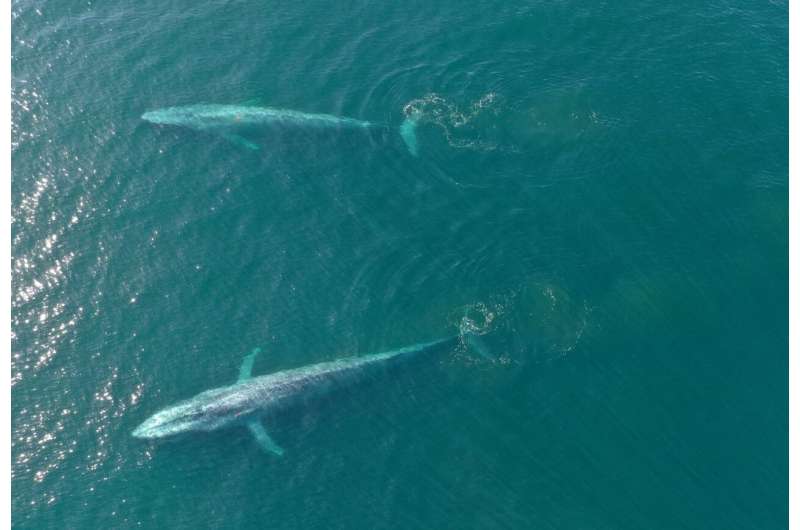This article has been reviewed according to Science X's editorial process and policies. Editors have highlighted the following attributes while ensuring the content's credibility:
fact-checked
peer-reviewed publication
trusted source
proofread
New research predicts effects of marine heat waves on top ocean predators

Forecasts can now predict the location and onset of marine heat waves that can disrupt marine ecosystems. Scientists say the next step is to forecast what happens to top predators that inhabit those ecosystems.
New research published in Nature Communications finds that the effects on marine predators such as sharks, tuna, and mammals vary widely and can redistribute species across international boundaries. Scientists predicted these shifts using species distribution models that account for changes in temperature and other environmental conditions.
"The goal is to provide forward-looking tools to help managers think ahead about how species could redistribute during heat waves and how they may need to proactively adjust regulations to account for these shifts," said Heather Welch, an affiliate researcher at NOAA Fisheries' Southwest Fisheries Science Center, a project scientist at U.C. Santa Cruz and lead author of the new research. "Predators often support important commercial fisheries, so it's important to understand how they respond to changes in their surroundings."
Marine heat waves have become a regular occurrence in the eastern Pacific Ocean off the West Coast in the last decade starting with a massive heat wave around 2014 to 2016. Some studies suggest they may become more common and severe with climate change. NOAA Fisheries is increasingly pursuing "climate-ready fisheries" by developing management strategies that can adjust to changes in ecosystems and their inhabitants.

Shifting regulations
Climate-ready fisheries management decisions could include, for example, open fishing seasons, quotas, and boundaries that adjust to changing distributions of species. These decisions are especially important for species such as tuna, which fleets want to catch, as well as others such as endangered sea turtles they want to avoid. The approach hinges on good information about how the species distributions are changing.
"How do we keep fishing sustainably and continue to protect important species in a world with a changing climate?" Welch asked. "We need to be prepared to change our approach as species move and shift. Fortunately, we can develop the tools to help do that in real time."
Scientists examined the effects of four major marine heat waves in the northeastern Pacific Ocean on 14 different predators including sea lions, bluefin tuna, mako sharks, and albatrosses. The effects on distributions varied across heat waves and species. In some cases the habitat of species came close to disappearing while in other cases it nearly doubled in area.
The researchers looked at how to develop an early-warning system that could alert managers to such changes before or as they happen.
"We are seeing large-scale changes in where and when predators go as a result of climate variability and change. Forecasting potential changes before they happen is critical for proactive climate-ready management," said Elliott Hazen, a research ecologist at the Southwest Fisheries Science Center. "That is how we can protect the species that need protection and ensure the sustainability of our fisheries and other ocean-based economies."

Habitat on the move
Almost 40% of the habitat of great white sharks shifted during marine heat waves from international waters into U.S. territorial waters. This could also affect other species they prey on. Between 10 and 31% of predicted habitat of commercially valuable albacore, bluefin, and yellowfin tuna shifted from Mexico to U.S. waters. This shift is reflected by an unusual abundance of yellowfin and bluefin tuna reported by California commercial and recreational fishers in 2014 and 2015.
"That gives an idea of the scale of the changes that management may have to adjust to in relatively short periods," Welch said.
In 2016, a marine heat wave along the California Coast brought many humpback whales into coastal waters. They fed on abundant anchovy that had shifted and multiplied with the unusual ocean conditions. The delayed Dungeness crab season then opened in the same waters, resulting in many humpback whales getting entangled in the lines from crab traps.
Since then the fishing fleet has worked with fisheries managers to evaluate and adjust to the presence of whales off the coast before going fishing. Confirmed entanglements have dropped.
As part of the new research, scientists developed models that track ocean temperatures and other factors to provide real-time predictions of how top predators shift during marine heat waves. These predictions could be further tailored to the needs of fisheries or other ocean managers, providing an early warning system that alerts them to ecological changes, the scientists said.
More information: Heather Welch et al, Impacts of marine heatwaves on top predator distributions are variable but predictable, Nature Communications (2023). DOI: 10.1038/s41467-023-40849-y
Journal information: Nature Communications
Provided by NOAA Headquarters


















